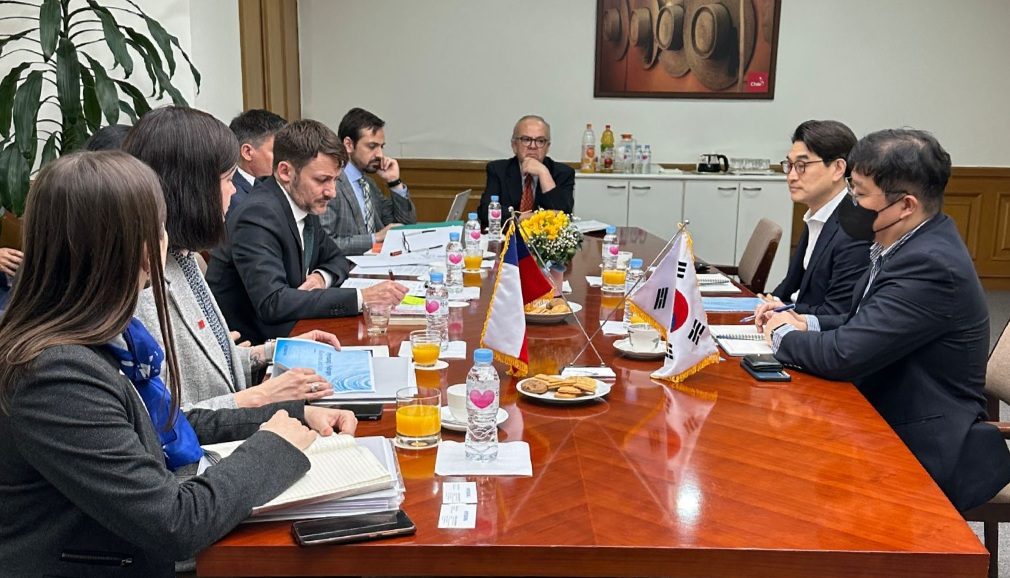
Essential information

Energy Roadshow in Asia concludes with more than 20 activities

- Led by Chile’s energy minister, the agenda included workshops and business activities, as well as field visits and bilateral meetings with representatives of multinationals and local authorities in South Korea and Japan.
As part of an intense schedule of activities in South Korea and Japan, InvestChile’s Head of Investment Promotion, Salvatore Di Giovanni, and Investment Commissioner for Asia, Vicente Pinto, met with more than 20 companies and local authorities to address the various business opportunities that Chile offers.
The roadshow, led by Energy Minister Diego Pardow, is part of InvestChile’s international agenda to promote and attract investment in priority sectors, particularly clean energy and green hydrogen.
The activities, which took place between April 23 and 27, included workshops, field visits and bilateral meetings in Seoul and Ulsan in Korea, and Tokyo and Yokohama in Japan.
Why South Korea?
South Korea has pushed an ambitious agenda to become a leader in the development of hydrogen as an alternative energy source. In 2019, the country announced its Roadmap for the Hydrogen Economy, whose goal is for 20% of its energy to come from this source by 2050.
Chile was the first country to sign a Free Trade Agreement with the Asian country in 2004, opening up a series of business opportunities for both economies.
In Seoul, the Korean capital, the delegation met with senior executives from Hyosung Heavy Industries, a firm that builds hydrogen stations. The company is exploring business opportunities in Chile, a country in which it set up a subsidiary in late 2022.
They also participated in a lunch organized by the Korea Chamber of Commerce and Industry, which was attended by representatives of OCI Company Ltd., Iljin Group, SG Engineering, Eagon Industrial Co. Ltd., LS Electric and KCCI.
InvestChile’s Head of Investment Promotion took part in a working meeting to implement a Memorandum of Understanding (MoU) between Chile’s Energy Ministry and the South Korean Ministry of Trade, Industry and Energy (MOTIE) on cooperation on low-carbon hydrogen. Companies interested in investing in Chile participated in the meeting, such as KEPCO, LOTTE Chemical and Hyundai Motor Company.
The delegation also participated in the “Chile-Korea Hydrogen Energy Strategic Association Seminar”, organized by H2Korea, MOTIE and InvestChile. Minister Pardow and InvestChile’s Head of Investment Promotion gave presentations at the event.
On their second day in Korea, the delegation visited the Port of Ulsan, the country’s main energy and liquid cargo port. During the visit, they met with senior port executives, and Minister Pardow gave a presentation on Chile’s potential as a global supplier.
They then visited LOTTE Chemical, a firm that is analyzing 14 ammonia production projects, several of which would be located in Chile. The company recently signed a Memorandum of Understanding with Sumitomo Corporation to explore joint opportunities.
The day concluded with a meeting with the mayor of Ulsan, Mr. Kim Doo-gyum, with whom they discussed decarbonization opportunities and the role of the port city in the South Korean and Asian ammonia market.
Why Japan?
In 2020, the Japanese government established a national green hydrogen strategy that aims to reduce the country’s reliance on fossil fuels and achieve carbon neutrality by 2050. The plan includes significant investment in hydrogen infrastructure, incentives for green hydrogen production and the promotion of hydrogen-powered vehicles and energy systems.
The activities of the Chilean delegation in Tokyo, the Japanese capital, began with a meeting with senior executives from the IHI Corporation. They had the opportunity to visit a 2MW-capacity pilot plant that works completely with ammonia.
During the day, there were meetings with representatives of the Japan Organization for Metals and Energy Security (JOGMEC), Marubeni, Toyo Engineering Corp., Mitsubishi Corporation, Japan Bank for International Cooperation (JBIC) and Idemitsu Kosan Co.
On the second day in Japan, they met with senior executives from Kawasaki Heavy Industries, Ltd., the first company in the world to successfully demonstrate the entire hydrogen supply chain. At the meeting, they were able to learn about the work that the company is doing in the first Hydrogen Energy Supply Chain (HESC), a pilot program between Australia and Japan that seeks to produce and transport liquid hydrogen.
The Chilean delegation then visited the Chiyoda Corporation pilot plant. The Japanese firm specializes in SPERA Hydrogen™ technology, which is used to transport and store hydrogen using Methylcyclohexane (MCH), a Liquid Organic Hydrogen Carrier (LOHC) that allows them to use the world’s existing infrastructure.
The day’s visits concluded with a meeting with representatives from Sumitomo, whose initial pre-feasibility studies indicate Chile’s enormous potential as a supplier of green ammonia to Japan.
During their last day in the Japanese capital, the delegation met with senior executives from Mitsui & Co. With more than 55 years of operating in Chile, Mitsui has developed different types of businesses, including large investments in the mining sector. The firm sees opportunities in the country in green ammonia and hydrogen, as well as the great potential of desalination.
The delegation also attended a meeting with representatives of the Institute of Energy Economics, Japan (IEEJ), an institution that has an important role in carrying out analysis and recommendations for decision-makers in the Japanese ecosystem.
To close the week, Japan’s Minister of Economy, Trade and Industry, Nakatani Shinichi, and Chile’s Energy Minister, Diego Pardow, signed a cooperation agreement focused on developing technology and human capital in renewable energy, energy efficiency, energy storage and green hydrogen.







